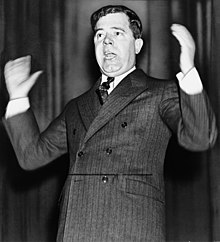Huey Pierce Long Jr.
| Huey Long | |
|---|---|

Long as a U.S. Senator
|
|
|
United States Senator from Louisiana |
|
|
In office January 25, 1932 – September 10, 1935 |
|
| Preceded by | Joseph E. Ransdell |
| Succeeded by | Rose Long |
| 40th Governor of Louisiana | |
|
In office May 21, 1928 – January 25, 1932 |
|
| Lieutenant |
Paul Narcisse Cyr Alvin Olin King |
| Preceded by | Oramel H. Simpson |
| Succeeded by | Alvin Olin King |
| Chair of the Louisiana Public Service Commission | |
|
In office 1922–1926 |
|
| Preceded by | Shelby Taylor |
| Succeeded by | Francis Williams |
| Louisiana Railroad Commissioner/Public Service Commissioner | |
|
In office 1918–1928 |
|
| Preceded by | Burk A. Bridges |
| Succeeded by | Harvey Fields |
| Personal details | |
| Born |
Huey Pierce Long Jr. August 30, 1893 Winnfield, Louisiana, United States |
| Died |
September 10, 1935 (aged 42) Baton Rouge, Louisiana, United States |
| Cause of death | Assassination |
| Resting place |
Louisiana State Capitol Baton Rouge, Louisiana, United States |
| Political party | Democratic |
| Spouse(s) | Rose McConnell Long (m. 1913–1935) |
| Relations |
George S. Long (brother) Earl Long (brother) Blanche Long (sister-in-law) Gillis Long (cousin) Speedy O. Long (cousin) Swords Lee (cousin) |
| Children |
Rose McConnell Long McFarland (1917–2006) |
| Alma mater | Tulane University (LLB) |
| Profession | Attorney, politician |
| Signature | |
Rose McConnell Long McFarland (1917–2006)
Russell B. Long (1918–2003)
Huey Pierce Long Jr. (August 30, 1893 – September 10, 1935), self-nicknamed The Kingfish, was an American politician who served as the 40th governor of Louisiana from 1928 to 1932 and as a member of the United States Senate from 1932 until his assassination in 1935. As the political leader of Louisiana, he commanded wide networks of supporters and was willing to take forceful action. He established the long-term political prominence of the Long family.
A Democrat and an outspoken populist, Long denounced the wealthy elites and the banks. Initially a supporter of Franklin D. Roosevelt during his first 100 days in office, Long eventually came to believe that Roosevelt's "New Deal" policies did not do enough to alleviate the issues of the poor. In time, he developed his own solution: the "Share Our Wealth" program, which would establish a net asset tax, the earnings of which would be redistributed so as to curb the poverty and homelessness epidemic nationwide during the Great Depression.
Long's Share Our Wealth plan was established on February 23, 1934 with the motto "Every Man a King". To stimulate the economy, Long advocated federal spending on public works, schools and colleges, and old age pensions. Long argued that his plan would enable everyone to have at least a car, a radio, and a home worth $5000.
...
Wikipedia
